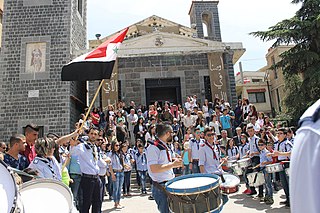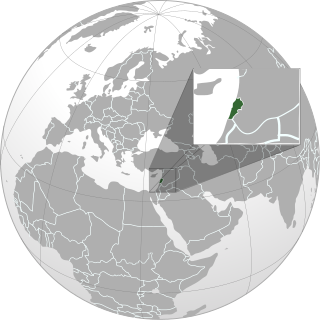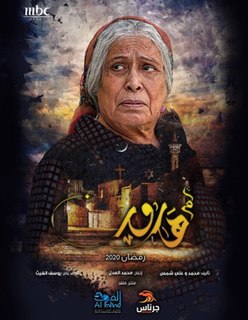Related Research Articles
The Land of Israel, also known as the Holy Land or Palestine, is the birthplace of the Jewish people, the place where the final form of the Hebrew Bible is thought to have been compiled, and the birthplace of Judaism and Christianity. It contains sites that are sacred to many Abrahamic religions, including Judaism, Samaritanism, Christianity, Islam, Druzism, and the Baháʼí Faith. The region has come under the sway of various empires and, as a result, has historically hosted a wide variety of ethnic groups. The adoption of Christianity by the Greco-Roman world under the Roman Empire in the 4th century led to a Christian majority in the Levant, which remained largely unchallenged until the Arab conquest of the region following the rise of Islam in the 7th century. It persisted for another six centuries as Muslim rule was consolidated despite various Christian military expeditions; by the end of the Crusader period in 1291, the Levant had shifted towards a Muslim majority. By the 13th century, Arabic had become the region's clear dominant language. It was individually first a part of the Mamluk Sultanate, and after 1516, a Syria-region province of the Ottoman Empire. Muslim rule over the Land of Israel ended during World War I, with the successful Sinai and Palestine campaign of the Allies leading to the partitioning of the Ottoman Empire and the establishment of British rule.

Palestinian Christians are Christian citizens of the State of Palestine. In the wider definition of Palestinian Christians, including the Palestinian refugees, diaspora and people with full or partial Palestinian Christian ancestry this can be applied to an estimated 500,000 people worldwide as of 2000. Palestinian Christians belong to one of a number of Christian denominations, including Eastern Orthodoxy, Oriental Orthodoxy, Catholicism, Anglicanism, Lutheranism, other branches of Protestantism and others. Bernard Sabella of Bethlehem University estimates that 6% of the Palestinian population worldwide is Christian and that 56% of them live outside of historic Palestine. In both the local dialect of Palestinian Arabic and in Classical Arabic or Modern Standard Arabic, Christians are called Nasrani or Masihi. Hebrew-speakers call them Notzri, which means Nazarene.
Palestinian refugees are citizens of Mandatory Palestine, and their descendants, who fled or were expelled from their country over the course of the 1947–49 Palestine war and the Six-Day War. Most Palestinian refugees live in or near 68 Palestinian refugee camps across Jordan, Lebanon, Syria, the West Bank and the Gaza Strip. In 2019 more than 5.6 million Palestinian refugees were registered with the United Nations.
Ami Popper is an Israeli mass murderer, convicted for the killing of 7 people in Rishon Lezion on May 20, 1990. Known as the Oyoun Qara massacre to Palestinians, for unknown reasons Popper killed and wounded Palestinian men at a bus stop in Rishon Lezion, for which he was sentenced to life imprisonment, later commuted to 40 years.
Islamic–Jewish relations started in the 7th century CE with the origin and spread of Islam in the Arabian peninsula. The two religions share similar values, guidelines, and principles. Islam also incorporates Jewish history as a part of its own. Muslims regard the Children of Israel as an important religious concept in Islam. Moses, the most important prophet of Judaism, is also considered a prophet and messenger in Islam. Moses is mentioned in the Quran more than any other individual, and his life is narrated and recounted more than that of any other prophet. There are approximately 43 references to the Israelites in the Quran, and many in the Hadith. Later rabbinic authorities and Jewish scholars such as Maimonides discussed the relationship between Islam and Jewish law. Maimonides himself, it has been argued, was influenced by Islamic legal thought.

The Greek Orthodox Patriarchate of Antioch, also known as the Antiochian Orthodox Church and legally as the Greek Orthodox Patriarchate of Antioch and All the East, is an autocephalous Greek Orthodox church within the wider communion of Eastern Orthodox Christianity. Headed by the Greek Orthodox patriarch of Antioch, it considers itself the successor to the Christian community founded in Antioch by the Apostles Peter and Paul.

The Murder of the Hatuel family was a shooting attack on May 2, 2004, in which Palestinian militants killed Tali Hatuel, a Jewish settler, who was eight months pregnant, and her four daughters, aged two to eleven. The attack took place near the Kissufim Crossing near their home in Gush Katif bloc of Israeli settlements in the Gaza Strip during the Second Intifada. After shooting at the vehicle in which Hatuel was driving with her daughters, witnesses said the militants approached the vehicle and shot the occupants repeatedly at close range.
Haddad is a primarily Levantine family name originating in Aramaic.

Arab Christians are ethnic Arabs, Arab nationals, or Arabic-speakers who follow Christianity. The majority of Arab Christians are from the Eastern Mediterranean region, although small native Christian communities can be found throughout the Arabian Peninsula and North Africa. Arab Christians, mainly forming Greek Orthodox and Greek Catholic communities, are estimated to number between 520,000 and 703,000 in Syria, 350,000 and 450,000 in Lebanon, 221,000 in Jordan, 133,130 in Israel, 50,000 in Palestine, 50,000 in Iraq, 18,000 in Turkey, and 10,000–350,000 in Egypt. There are also smaller Arab Christian communities in Bahrain, Yemen and Kuwait.

Reuven "Ruvi" Rivlin is an Israeli politician and lawyer who served as the tenth president of Israel between 2014 and 2021. He is a member of the Likud party. Rivlin was Minister of Communications from 2001 to 2003, and subsequently served as Speaker of the Knesset from 2003 to 2006 and 2009 to 2013. On 10 June 2014, he was elected President of Israel. His term ended on 7 July 2021.
The Arab–Israeli conflict began in the 20th century, evolving from earlier Intercommunal violence in Mandatory Palestine. The conflict became a major international issue with the birth of Israel in 1948. The Arab–Israeli conflict has resulted in at least five major wars and a number of minor conflicts. It has also been the source of two major Palestinian uprisings (intifadas).

The history of the Jews in Lebanon encompasses the presence of Jews in present-day Lebanon stretching back to biblical times. Following large-scale emigration following the 1948 Arab–Israeli War, and much more importantly the Lebanese Civil War, the vast majority of Lebanese Jews now live in Western countries and many live in Israel. As the latest census in Lebanon was conducted in 1932, there are virtually no statistics available. In 2006, there were about 40 Jews in Lebanon whereas in 2020 there were only about 29 Jews in Lebanon.
Four major religious groups originated in the Middle East. Smaller minority religions, such as the Baháʼí Faith, Druze, Alawites, Manichaeism, Bábism, Yazidism, Mandaeism (Sabianism), Yarsanism, Samaritanism, Shabakism, Ishikism, Ali-Illahism, Alevism, Yazdânism and Zoroastrianism are also present in the Middle East.

The history of Jews in Qatar is relatively limited.

Osama Hamdan is a senior representative of Hamas in Lebanon and is a member of the organization's politburo. He is a member of the Arab National Congress and of the Arab Islamic Conference of the Board of Trustees of the Jerusalem Institute in Lebanon.

Tsvi Jekhorin Misinai is an Israeli researcher, author, historian, computer scientist and entrepreneur. A pioneer of the Israeli software industry, he now spends most of his time researching and documenting the common Hebrew roots he believes shared by world Jewry and the Palestinians.

The Arab League boycott of Israel is a strategy adopted by the Arab League and its member states to boycott economic and other relations between Arabs and the Arab states and Israel and specifically stopping all trade with Israel which adds to that country's economic and military strength. A secondary boycott was later imposed, to boycott non-Israeli companies that do business with Israel, and later a tertiary boycott involved the blacklisting of firms that do business with other companies that do business with Israel.

Um Hārūn is a Kuwaiti television series that started airing during the 2020 Ramadan TV season, a time when TV viewership in Arabic-speaking countries is very high. Most of the actors and actresses are from Arab states of the Persian Gulf, with the most notable being from Kuwait.
References
- ↑ "A Martyr from Lebanon: Life in the Shadow of Danger"
- ↑ "From Khan Yunis to a Jewish wedding".
- ↑ "Memorial to be Held for Fighter". Israel National News. Retrieved 2021-07-20.
- ↑ "New Straits Times - Google News Archive Search". news.google.com. Retrieved 2021-07-20.
- ↑ "Basma Al-Kuwaiti Converts from Islam to Judaism, Stirs Controversy".
- ↑ "Popular Arab singer becomes Jewish". Arutz-7. Retrieved 11 October 2019.